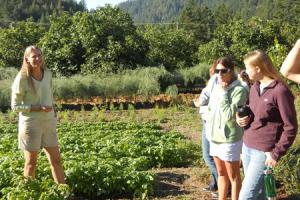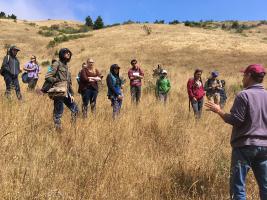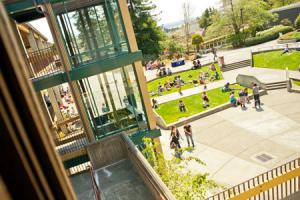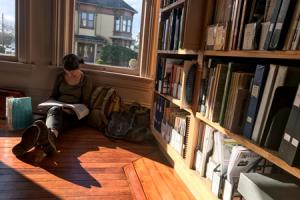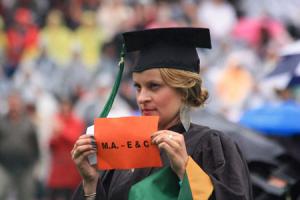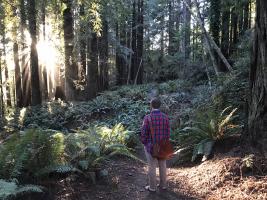Spring 2019
Spring 2019 lectures will be held on Thursdays from 5:30 – 7:00 pm in Founders Hall 118.
-
January 31, Pamela Flick—The return of gray wolves to California
Pamela Flick is the Senior California Representative for Defenders of Wildlife and is based in Sacramento, where she works on federal land management focused on Sierra Nevada national forests and advancing conservation of carnivores, birds and amphibians. She is a founding steering committee member of the Pacific Wolf Coalition and was an active participant of the California Department of Fish and Wildlife’s Wolf Stakeholder Working Group, convened to help shape a plan for conserving and managing wolves as they recolonize their historical habitat in our state. Prior to joining Defenders in 2005, Flick worked for eight years to protect public lands and rivers with the California Wild Heritage Campaign, the Sierra Nevada Forest Protection Campaign, and Friends of the River. She is a third-generation California native and hails from Mariposa.
-
February 14, Ranjit Deshmukh—The promise and challenges of wind and solar: stories from India and Africa
With abundant resources and declining costs, wind and solar technologies have the potential to significantly decarbonize our energy systems. These technologies now present an opportunity especially for developing economies to leapfrog to a more sustainable and low carbon future. However, their large-scale deployment introduces challenges in operating and planning future electricity systems, and will require balancing trade-offs with social and environmental objectives. From the economic and environmental impacts of India’s ambitious renewable energy targets to the potential of wind and solar as alternatives to large hydropower and coal in Africa, Ranjit Deshmukh will use examples from his research to highlight the opportunities and challenges posed by a large scale transition to renewable energy in developing economies.
Ranjit Deshmukh is an Assistant Professor in the Environmental Studies department at the University of California Santa Barbara. His research interests lie at the intersection of energy, environment, and economics, specifically in low carbon energy systems, energy access, and electricity markets. Prior to joining the University of California Santa Barbara, Deshmukh was an ITRI-Rosenfeld postdoctoral fellow at the Lawrence Berkeley National Laboratory. He holds a PhD in Energy and Resources from the University of California at Berkeley, master’s degrees in Engineering from Cal Poly Humboldt and University of Texas at Austin, and a bachelor’s degree from the Government College of Engineering Pune, India. He was a Siebel Scholar and a Link Energy fellow while at UC Berkeley and a Schatz Energy fellow at Cal Poly Humboldt.
- February 28 — Women and the timber wars: feminism and the front line struggle to save the redwoods — a panel discussion with Alicia Littletree, Naomi Wagner, and Ellen Taylor— Women were undeniably instrumental in the fight to protect ancient forests during the Timber Wars, yet historians and movement scholars have overlooked their contributions. Their actions, informed by a feminist intersectionalism that rejected misanthropy, machismo, patriotism and anti-labor biases, would come to be the most important examples of eco-defense in North America.
This panel explores their contributions and highlights the confluence of feminism and eco-defense in past and present struggles to save the redwoods.
-
March 28, Aldaron Laird—Humboldt Bay on the threshold of change: sea level rise challenges to a sustainable future
Environmental planner Aldaron Laird specializes in sea level rise vulnerability assessments and adaptation planning, specifically in the Humboldt Bay region. He helped create the first baseline vulnerability assessment of the shoreline on Humboldt Bay, and was the lead planner for the Humboldt Bay Sea Level Rise Adaptation Planning Project. Laird has completed sea level rise vulnerability assessments for all the Local Coastal Program authorities on Humboldt Bay and participated in Caltrans’ District 1 Climate Change Pilot Study on the Highway 101 corridor. Recently, he authored a portion of the 4th California Climate Change Assessment that described sea level rise vulnerability and adaptation opportunities on the North Coast, specifically for Humboldt Bay, completed a diked shoreline sea level rise adaptation feasibility study of Humboldt Bay, and held public education and outreach workshops for three communities at risk from sea level rise. At Cal Poly Humboldt, Laird serves as co-chair of the university’s Sea Level Rise Initiative.
In his lecture, Aldaron will highlight the significant changes we could see on Humboldt Bay with just 2.0 meters of sea level rise, which could occur between 2070 and 2100, based on new probabilistic projections. Millions of dollars will need to be invested to secure our future on Humboldt Bay. He will discuss the changes and associated challenges to be expected to geography, land and water uses, transportation and utilities infrastructure and coastal cultural and environmental resources.
-
April 4, The Environmental Sustainability of Energy Use at Humboldt—a panel discussion
Cal Poly Humboldt has set ambitious climate action goals, including a target to achieve an 80% reduction in greenhouse gas emissions relative to 1990 levels by 2040. This panel will highlight the challenges and opportunities at Humboldt for reducing energy use and greenhouse gas emissions. The discussion will include an overview of energy use patterns on campus, current approaches for reducing energy use and emissions, and possible future strategies to make progress toward the campus' climate action goals. The panel will be moderated by Schatz Center Director Arne Jacobson.
Andrea Alstone is an Energy Planner and Analyst in Facilities Management at Humboldt, where she is responsible for tracking campus energy use and planning for its future. Her prior work on energy issues includes projects at the Redwood Coast Energy Authority, Lawrence Berkeley National Lab, and the Schatz Center.
Morgan King is a Climate Action Analyst in Facilities Management at Humboldt, where he facilitates climate action and resiliency planning, advises students, and furthers the infusion of sustainability into campus operations and academics. Morgan has over 20 years of experience working in sustainability, environmental education and green workforce development.
Gwelen Paliaga is the Technical Director within TRC‘s Research and Technology Commercialization practice. He has 15 years of experience in commercial building energy efficiency and building science research, with expertise in design and operation of high performance buildings, research and emerging technology, and codes and standards development.
Oona Smith is a Senior Planner for the Humboldt County Association of Governments — a Regional Transportation Planning Agency — where she promotes public transit, walking, and bicycling. She earned a Master’s degree in International Development Technology from Humboldt.
-
April 11, Robert Collier—California offshore wind: the challenges of "high road" climate policy
Planning is underway to site huge floating wind farms along California’s coast, including offshore Humboldt County, to help the state reach its goals of 100 percent clean energy. But these plans underline one of the key questions for California climate policy – Will the green economy accentuate or narrow the state’s widening income and opportunity gaps? In the case of offshore wind, an entirely new industry is envisioned, which could have a uniquely “high road” potential for well-paying jobs, community benefits, an industrial supply chain, and major infrastructure improvements. But achieving this will not be easy. This presentation will explain this conundrum for offshore wind and state climate policy in general.
Robert Collier is a policy analyst at the UC Berkeley Center for Labor Research and Education, where he researches labor and workforce issues in the clean energy economy. In particular, his work focuses on policy for the transition from fossil fuels to renewable energy, including emerging technologies such as offshore wind power. Prior to joining the Labor Center in 2016, he was a consultant to environmental nonprofits and foundations on a variety of issues related to renewable energy and climate policy, and he spent 16 years as a staff reporter for the San Francisco Chronicle, covering international news, energy, and climate policy.
- April 25 — We are Sunrise: building a movement of young people to stop the climate crisis with a Green New Deal
A panel discussion with members of the Sunrise Movement Bay Area.
-
May 2, Nick Reo—Love and accountability in Indigenous environmental research
Nicholas J. Reo is a citizen of the Sault Ste. Marie Tribe of Chippewa Indians and an Associate Professor of Native American and Environmental Studies at Dartmouth College, where he studies Indigenous knowledge and ecological stewardship on Indigenous lands. Reo blends ecological, anthropological and Indigenous methodologies in his work, often via tribal community-university partnerships.
In this talk, he will explore research ethics and the concept of “relational accountability” in Indigenous environmental studies, sharing both his personal experiences and his perspective as an Anishnaabe scholar.

